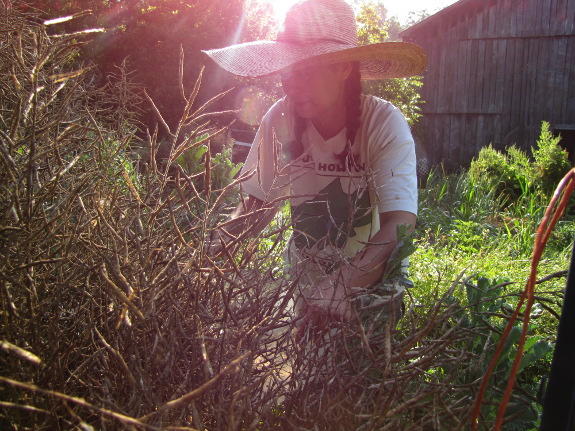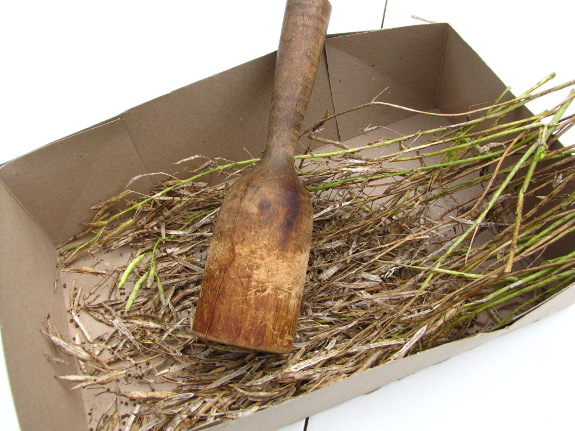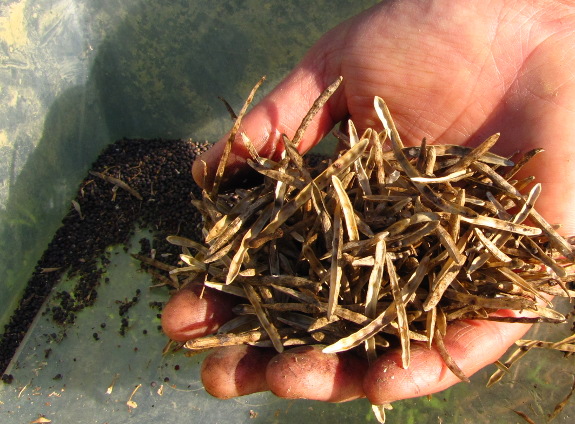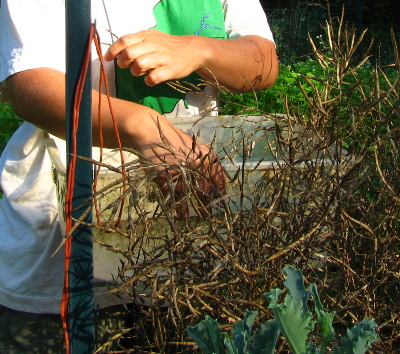
How to harvest kale seeds

 I've been learning to save a
lot of different kinds of seeds over the last few years, and the most
difficult part seems to be figuring out the best processing technique
to get seeds out of their fruits or hulls. With the first
crucifer I processed (tokyo
bekana), I gathered
the whole top of the plant and pounded it with a big wooden pestle to
break the seed cases apart. My new method with kale seems to be
even more streamlined.
I've been learning to save a
lot of different kinds of seeds over the last few years, and the most
difficult part seems to be figuring out the best processing technique
to get seeds out of their fruits or hulls. With the first
crucifer I processed (tokyo
bekana), I gathered
the whole top of the plant and pounded it with a big wooden pestle to
break the seed cases apart. My new method with kale seems to be
even more streamlined.
Seed
to Seed warned me
that kale fruits ripen a few at a time over the course of a week or
two. If you rip up the whole plant, you'll either lose some seeds
due to premature shattering (opening) of the early pods, or you'll
harvest seeds that won't sprout since they're not fully mature.
So I set off to break the ripest-looking kale pods into a container,
figuring I'd come back in a week to harvest the rest.

 As I worked, I realized that
it was even easier to simply thresh the ripe pods directly into my
container than to break off clusters of pods. Running a fruiting
head through my hand resulted in lots of seeds and some pod bits making
their way into my box, which meant the threshing and winnowing stage
was as simple as shaking the box so the seeds settled to the bottom,
scooping out most of the pod bits, and then blowing the rest away.
As I worked, I realized that
it was even easier to simply thresh the ripe pods directly into my
container than to break off clusters of pods. Running a fruiting
head through my hand resulted in lots of seeds and some pod bits making
their way into my box, which meant the threshing and winnowing stage
was as simple as shaking the box so the seeds settled to the bottom,
scooping out most of the pod bits, and then blowing the rest away.
This week was my second
round of harvesting, and a few minutes' work netted half a pound of
kale seeds! Kale seeds are good for three to five years, so I
shouldn't have to save seeds again for quite a while. Now I just
have to wait and see if the information I was given on kale
hybridization is
correct (meaning that I should end up with two unsullied varieties, the
same as I grew last year) or if my Red Russian and Improved Dwarf
Siberian interbred (meaning that these seeds will turn into the kale
equivalent of an alley cat).
Want more in-depth information? Browse through our books.
Or explore more posts by date or by subject.
About us: Anna Hess and Mark Hamilton spent over a decade living self-sufficiently in the mountains of Virginia before moving north to start over from scratch in the foothills of Ohio. They've experimented with permaculture, no-till gardening, trailersteading, home-based microbusinesses and much more, writing about their adventures in both blogs and books.
Want to be notified when new comments are posted on this page? Click on the RSS button after you add a comment to subscribe to the comment feed, or simply check the box beside "email replies to me" while writing your comment.

Mitsy --- It doesn't have everything you might grow on it, but I've made a post about vegetable seed longevity. I got the information from a lot of googling (name of vegetable + "years" works well).
Of course, seed longevity will also depend on how carefully you store them in a cool, dry place. If you have room in your freezer, they'll last even longer in there as long as you put them in a sealed container so they don't get wet when they thaw.